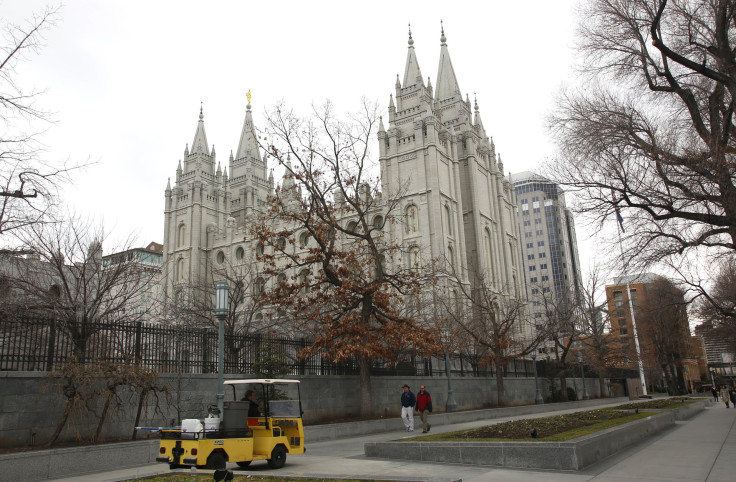Utah LGBT Discrimination Law Backed By Mormon Church Comes With Concerns

Last week, Utah Gov. Gary Herbert signed a bill that extends employment and housing discrimination protections to lesbian, gay, bisexual and transgender people and anyone perceived to be LGBT. But there’s a catch: Religious organizations, from churches and colleges to hospitals and high schools, are completely exempt. So, too, are corporations that are affiliates or wholly owned subsidiaries of religious groups (not uncommon in the heartland of Mormonism) and the Boy Scouts of America.
The next few years will likely shed light on the breadth of the exemptions. But at the moment, it seems if you’re a gay janitor at Brigham Young University or a transgender receptionist at any one of the many businesses owned by The Church of Jesus Christ of Latter-day Saints, including Beneficial Life Insurance, prominent Salt Lake City newspaper Deseret News or broadcasting company Bonneville International, then tough luck.
Gay rights groups worked with the Utah-based Mormon church to craft the bill and praised its passage through the Republican-dominated legislature. Chad Griffin, president of the nation’s largest gay rights group, the Human Rights Campaign (HRC), praised an “incredible and collaborative victory.” Equality Utah, the state’s leading gay advocacy organization, said the legislation proves LGBT protections “can gracefully coexist with the rights of people of faith.”
Other LGBT advocates are more skeptical.
They argue that the bill should never have passed, pointing out that last summer, when Congressional Republicans added similar religious exemptions to proposed federal legislation barring LGBT employment discrimination, major gay rights groups chose to pull their support from the bill rather than champion a compromised version of it.
“We have to stop apologizing for seeking out civil rights protections,” says Heather Cronk, co-director of GetEqual, which pushes for employment nondiscrimination measures at the federal and state levels.
Some worry that Utah’s new law could serve as a model for passing anti-discrimination measures in other conservative-leaning locales. Thirty-two states, most of them in the GOP-dominated South and Mountain West, do not explicitly prevent employers from firing or harassing gay and transgender workers. Studies estimate anywhere from 15 percent to 43 percent of gay and transgender workers have experienced some type of discrimination on the job.
“The Utah compromise sets a dangerous precedent for the expansion of LGBT rights to be coupled with carve-outs for continued discrimination by religious institutions,” says Jerame Davis, executive director of Pride at Work, a union-affiliated gay advocacy group.
“Using the justification that ‘It’s Utah!’ doesn’t move us forward; it sets a precedent for other states to also claim exemptions to these laws,” Cronk says.
On the other hand, the law may turn out to be an anomaly. In no other state does the Mormon church carry such political sway.
North Dakota state Rep. Joshua Boschee, for one, isn’t drawing any inspiration. The state Senate has already passed an anti-discrimination bill, and Boschee, a Democrat, leads efforts to approve it in the Republican-controlled state House of Representatives. North Dakota also has the nation’s highest rate of religious adherence after Utah, about 67 percent, according to a 2010 survey.
“While the state legislators in Utah will do what they think is best for their citizens, I find it hard to rationalize codifying discrimination based on religious beliefs or conscience in the name of any religion,” Boschee says.
Representatives from the HRC and Equality Utah did not respond to requests for comment.
There’s another less glaring but equally alarming part of the bill, says Eric Ethington, a journalist from Utah who also serves as communications director for Political Research Associates, a liberal group that monitors the religious right. He points to the bill’s enhanced protections for religious speech -- measures that could, in theory, apply to anything from an office employee berating her transgender co-worker to a restaurant owner refusing service to a gay couple. Ethington worries that vision of religious liberty just won some valuable political cover from liberals.
“I’m terrified of it, to put it frankly,” he says of the legislation. “What good are the protections when you create a system that allows the protections to be taken away at any time?”
Ethington pointed out another bill in Utah that passed soon after the anti-discrimination legislation. It allows state officials to opt out of issuing same-sex marriage licenses on religious grounds.
“When you open Pandora’s box, it’s almost always impossible to close it again,” Ethington says.
© Copyright IBTimes 2025. All rights reserved.





















